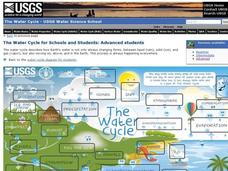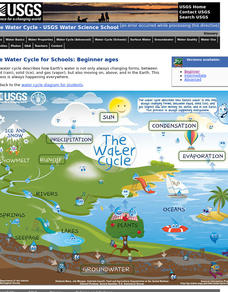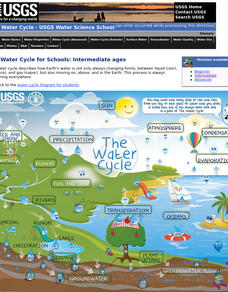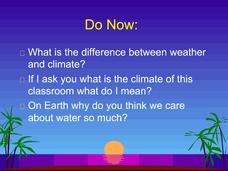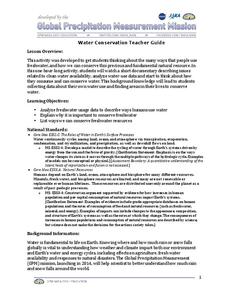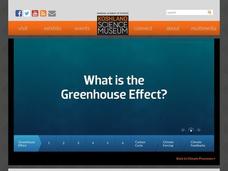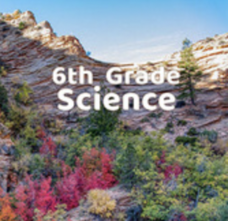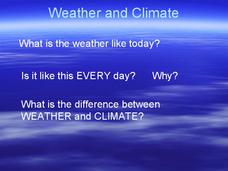Signing Time Foundation
What is the Water Cycle?
Dive into an exploration of the water cycle cycle with this simple earth science lesson. After first discussing where rain comes from, young scientists define the terms condensation, evaporation, transpiration, and precipitation as a...
National Wildlife Federation
The Water Cycle
Observe the water cycle from the comfort of your classroom with this excellent earth science experiment. Working collaboratively, young scientists first create terrariums complete with hills, plants, lakes, and an atmosphere,...
UNESCO
The Water Cycle
Young scientists get their feet wet as they learn about the water cycle in this series of activities. Whether they are observing how evaporation causes puddles to dry up, or how plants put water into the atmosphere through transpiration,...
Scholastic
Study Jams! The Water Cycle
Will tomorrow's soccer game be rained out? That depends on the water cycle. An animated feature explains precipitation, evaporation, transpiration, and condensation with diagrams and dialogue between Sam and RJ as they huddle under a...
US Geological Survey
The Water Cycle for Schools: Advanced Ages
Explore the water cycle in an interactive diagram of the process. The diagram shows how water is a moving system and constantly changing forms. The resourc includes vocabulary words that pupils click on in order to discover more about...
Curated OER
The Water Cycle
Your class sets up a mini water cycle model to examine the process. Then they watch an animation, following a water molecule through the cycle. A well-developed lab sheet guides learners through the lesson and a PowerPoint presentation...
US Geological Survey
The Water Cycle for Schools: Beginner Ages
Explore a day in the life of a water droplet. An interactive infographic helps scholars learn how water cycles work from precipitation all the way around to condensation. Learners hover over each step of the cycle to read more as they...
US Geological Survey
The Water Cycle for Schools: Intermediate Ages
Water can travel from the highest mountain tops to the largest oceans. Using an interactive, young scientists trace the movement using an interactive online resource. They follow the water cycle by reading pop-up explanations on a...
NOAA
The Cycle of Water
Help young scientists get to the bottom of the water cycle with this comprehensive earth science lesson. After first viewing and discussing presentations about the states of water and the water cycle, the class performs a series of...
Port Jefferson School District
Water and Climate
Dive into a lesson on the hydrosphere with this Powerpoint presentation. Building on prior knowledge of the water cycle, young scientists learn what happens to water after it falls as precipitation and explore the different factors...
Curated OER
Water Conservation
Open learners' eyes to the challenge of finding safe drinking water – something we often take for granted in our country. The PowerPoint presentation includes images, graphs, diagrams, and even a video to stimulate discussion on how we...
Curated OER
Unit 3: Scientific Writing
Write-on! Demonstrate a writing model and support learners as they write an informational essay on a water resource issue of your (or their) choosing. The lesson plan provides a well-scaffolded summative writing experience that wraps up...
National Academy of Sciences
What is the Greenhouse Effect?
The greenhouse effect warms up earth enough so it can support life, but if it heats up too much, life won't be able to survive. An interactive presentation covers the greenhouse effect, the carbon cycle, climate forcing, and climate...
Curated OER
Rocks: Mineral Mixtures
A 22-slide set provides pretty much everything you need to teach the rock cycle except the actual specimens. All of the slides contain graphics or photographs to help describe the process, and most even have links to educational videos....
Discover Earth
Weather Stations
Transform your classroom into a fully functioning weather station with this series of hands-on investigations. Covering the topics of temperature, precipitation, wind patterns, and cloud formation, these activities engage young...
National Energy Education Development Project
Exploring Hydropower
In 2006, about 20 percent of the world's electricity was generated from hydroelectric power. In the presentation, scholars review the water cycle and gravitational energy to begin to understand how humans harness the power of water. They...
Chicago Botanic Garden
Greenhouse Gas Emissions — Natural and Human Causes
What impact do humans have on greenhouse gas emissions? What are the natural causes of these gasses? Thanks to the carbon cycle, carbon dioxide eats away at the earth's atmosphere with the intensified help of humans. Young scientists...
Utah Education Network (UEN)
Utah Open Textbook: 4th Grade Science
How does weather affect Earth? Learners understand the characteristics of water and make predictions about weather patterns. They recognize how water and weather affect rocks and minerals through erosion. They also learn about fossils...
Utah Education Network (UEN)
Utah Open Textbook: 6th Grade Science
There are many interactions among living things and their surroundings. By completing a reading, scholars learn about the Earth, the moon, and the sun and how they relate to the solar system. They also investigate the basics of physical...
University City High School
Metabolism Lesson Plan
Not a lesson in the traditional sense, this is a collection of resources with which you can craft a lesson on metabolic processes. It includes an outline of topics, some brief discussion, and a large array of animations, images, and...
Serendip
Using Models to Understand Cellular Respiration
Energize biologists with colorful images in an activity that captivates the imagination while demystifying the subject of cellular respiration. Participants build comprehension skills and access core content knowledge by analyzing text...
Biology Junction
Nonvascular and Simple Vascular Plants: Mosses to Ferns
Sometimes conservationists use specific plants to prevent erosion or fight invasive species. A 50-slide presentation covers both nonvascular and vascular plants. It discusses the plants, their stages and life cycles, reproduction, uses,...
Texas State Energy Conservation Office
Global Climate Change
Here is an extensive reading resource that addresses our climate change crisis. It thoroughly explains the greenhouse effect, related Earth cycles, and the history of climate change. Use it as part of the intended unit, published by the...
Curated OER
Weather and Climate
It's hot today, but is that the weather or the climate? This colorful presentation isolates both concepts to allow for better understanding by covering the positioning of the planet, making comparisons of land versus water, and looking...
Other popular searches
- Water Cycle Diagram Label
- Water Cycle Diagram Kids
- Free Water Cycle Diagram
- Water Cycle Diagram Blank
- The Water Cycle Diagram
- Water Cycle Diagram Quiz
- Ocean Water Cycle Diagram
- Wetlands Water Cycle Diagram
- Water Cycle Diagram Internet
- Diagram of the Water Cycle
- Water Cycle Diagram Ouiz
- Water Cycle Diagram Ruiz






